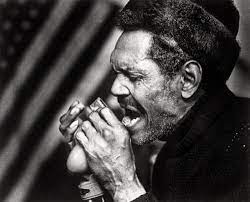The 5 Best Songs by Big Walter Horton
Big Walter Horton, also known as Walter “Shakey” Horton, is revered as one of the greatest harmonica players in blues history. Born in Horn Lake, Mississippi, in 1917, and active on the Chicago blues scene, Horton combined technical brilliance with deep emotional expression. His smooth, powerful tone influenced generations of blues musicians, including the likes of Little Walter, Carey Bell, and James Cotton.
Though he often played in a sideman role, Horton also recorded remarkable solo work that showcases his mastery of the harmonica. Here are five of the best songs that highlight his artistry, innovation, and enduring impact on the blues.
1. “Easy” (1953)
This instrumental, released by Sun Records, is one of Horton’s earliest and most iconic recordings. “Easy” is a slow blues that perfectly demonstrates his melodic phrasing and breath control. His harmonica sings with a soulful, almost vocal quality, setting a high standard for blues harp players. The track helped solidify his reputation as a harmonica virtuoso.
2. “Hard-Hearted Woman” (1954)
On this track, Horton delivers both vocals and harmonica, blending pain and power in a classic tale of heartbreak. The harmonica work here is raw and expressive, matching the emotional tone of the lyrics. Recorded during his tenure at Chess Records, “Hard-Hearted Woman” captures the gritty realism of Chicago blues at its finest.
3. “Have a Good Time” (with Johnny Shines, 1969)
From the album Johnny Shines with Big Walter Horton, this track is a standout collaboration. Horton’s harmonica serves as both accompaniment and lead, weaving seamlessly around Shines’ vocals and guitar. His playing here is vibrant, lyrical, and full of feeling, elevating the song into a showcase of blues interplay at its best.
4. “Walter’s Boogie” (1972)
A dazzling instrumental from the album Fine Cuts, “Walter’s Boogie” is a tour de force performance. Horton demonstrates his full command of the harmonica, delivering rapid-fire runs, rhythmic chugs, and melodic variations. It’s an exuberant piece that shows off his deep understanding of both traditional and modern blues styles.
5. “That’s Why I’m Crying” (1972)
Taken from his celebrated album Big Walter Horton with Carey Bell, this track features Horton in a reflective, mournful mood. His harmonica lines echo the sadness of the lyrics, with subtle bends and sustained notes that evoke deep emotion. It’s a prime example of his ability to make the harmonica weep, sigh, and speak directly to the soul.
Conclusion
Big Walter Horton’s contribution to blues music is immeasurable. These five songs only scratch the surface of his talent, but each offers a window into his genius as a harmonica player and interpreter of the blues. Whether he was playing solo or alongside other legends, Horton brought a distinctive voice to the genre — one that continues to resonate with blues fans around the world.


Comments are closed